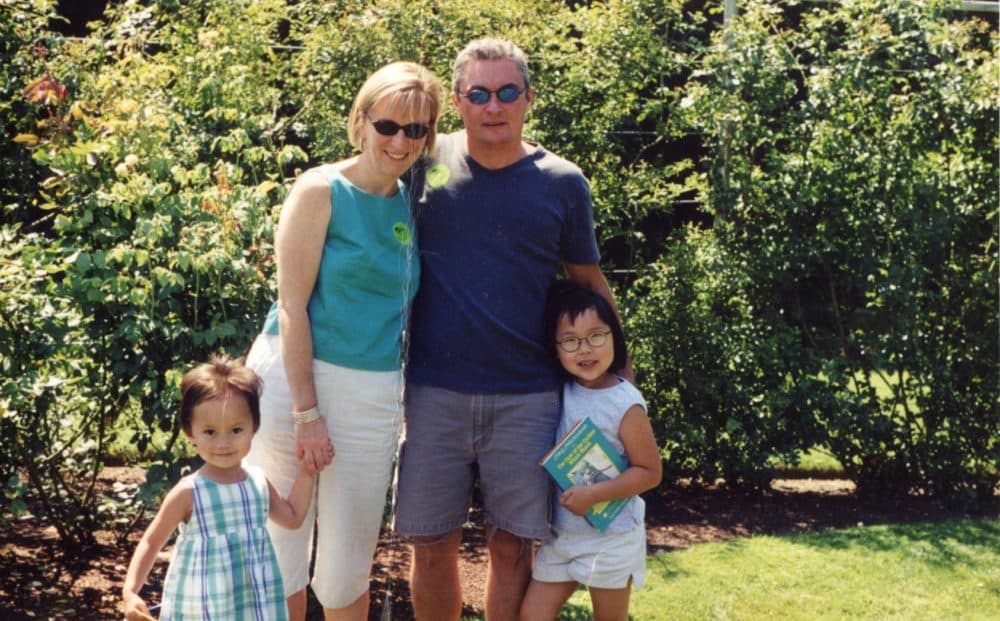Advertisement
Commentary
Love in the time of transition

Editor's Note: The author and her spouse decided to use the pronoun "she" in this essay to refer to Alex in the period before Alex transitioned. A version of this essay aired on the radio show "The Moth."
Sophie, our 5-year-old daughter, sat, hands folded, peering through her round glasses at us, her two moms. We had something important to tell her, but now, at the kitchen table, we didn’t know where to start. I looked over at Alex. I knew she’d find the words.
Alex had a rare gift for digging out the right words at the right time. I, on the other hand, operated on a delay, composing responses in important matters only after consulting at least one book.
But my books didn’t help me when Alex confronted the lifelong gender issues that wouldn’t go away this time, when she told me she needed to transition from female to male.
I didn’t take this news well. We’d been married a dozen happy years, with two small children.
I loved being the gay 'Leave it to Beaver' family in the neighborhood.
I was in a Ph.D. program at the time, and I used academia to hide from things I feared. I decided to use my patchy knowledge of European post-structuralist philosophy to talk Alex out of her experience.
We had conversations like this:
Alex: “I’m suffering. I need to begin living as a man, so my body will finally match my mind.”
Me: “No; you’re suffering from your unnuanced view of the mind-body split. Gender is socially constructed; it’s a performance. Here’s an article to read.”
She’d say, “I’ve felt male, even in my first memory. My whole life, I’ve never felt female, not even for a minute. And I’m tired. I’m so tired.”
I’d say, “You’re worn out from buying into unexamined binary oppositions, one of the foundational problems with western culture.”
I wanted to freeze our little family in that moment ...
Alex stopped talking. I thought she was coming around. But it turned out that she was waiting for me.
My friends couldn’t believe I had a problem. They said, “What would be so different? Everyone calls her ‘sir’ in the grocery store anyway.”
Alex tried to let me off the hook. “It’s OK that you don’t understand. Why would you? You weren’t born with gender dysphoria.”
But I didn’t understand. And I thought love and understanding had to be one and the same.
Finally, Alex said, “I need to do this. I need to transition, and I don’t want to do it without you. I love you, and I want to bring you along. Even if you don’t understand.”
In a sudden, almost mystical turnaround that even I didn't understand, I agreed to come along.
... I loved Alex’s voice, which was clear and warm, with a Boston accent that sounded like jazz whenever she said 'Charles River.'
Now it was time to tell Sophie, who possessed the mind of a miniature Greek philosopher. Sophie spoke in full paragraphs at age 2, in full chapters at 5. She was like a visiting professor from another planet, studying us. She often shared her findings.
We fell over ourselves to the point of foolishness in our effort to be perfect parents to Sophie and her baby sister, Pia, curating their lives into one big left-wing Pottery Barn Kids catalog. Once, when Sophie looked up from her book to find us plastering photos of queer astronauts on her bulletin board, she remarked, “I have a feeling you two don’t actually know what you’re doing.”
Sophie adored Alex, whom she called Mumu. Alex was terrified of hurting their special bond with her news. But she knew Sophie would want to hear it from her directly, so when we got to that moment, Alex swallowed hard.
“Sophie,” she said, “I’ve always felt, deep inside, more male than female, more like a dad than a mom. And now I’m taking steps so my outside will better match my inside. I’ll be taking medicine to be more like a dad.”
We waited. Sophie nodded. Alex took a breath and continued.
“You’ll start to see some changes. My shoulders will get bigger, more like a dad. I’ll start to grow a beard. My voice will start to get lower, more like a dad.”
Alex paused. Tears started to slide down Sophie’s face. She had a round little face, and the tears leaked down the sides.
I said, “Oh, sweetie, I know — it’s hard to understand.”
“No,” she said. “I understand. People get to be more like who they are. It’s just … ”
We waited.
“It’s just your voice. I’ll miss your voice. I don’t want it to change. I love your voice.”
It hit me: That’s what I’d felt all along, too. It wasn’t the immaterial philosophy. It was that I loved Alex’s voice, which was clear and warm, with a Boston accent that sounded like jazz whenever she said "Charles River." I didn’t want one beautiful thing about Alex to change.
I wanted to freeze our little family in that moment: Alex speaking from the heart; Sophie, now on Alex’s lap, touching her face where the beard would grow; Pia a few feet away, banging a spoon on a pot.
I managed a few words. “Here’s the thing about voices, Soph. They stay with you your whole life, no matter what. We can listen for her old voice in his new voice.”
The next day, Sophie went sledding with friends. At the top of the hill, she announced that her Mumu was taking medicine to be more like a dad, and if anyone had any questions, she’d be happy to answer them.
That was 22 years ago. It was when I first learned something that I learned again each day, as Alex transitioned without losing the warm clarity in his voice, as Sophie and Pia grew into incomprehensible teenagers and astonishing young adults.
I learned that it’s not necessary — or even possible — to fully understand the people I love. And even so, it's possible to love them fully.
